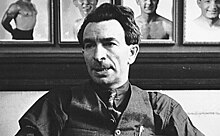Jack Pfefer
| Jack Pfefer | |
|---|---|

Publicity still of Jack Pfefer.
|
|
| Born |
December 10, 1894 Warsaw, Poland |
| Died | September 13, 1974 (aged 79) Plymouth, Massachusetts, United States |
| Professional wrestling career | |
| Ring name(s) | Jack Pfefer |
| Debut | c. 1924 |
| Retired | 1967 |
Jack Pfefer (also commonly spelled as "Pfeffer"; December 10, 1894 - September 13, 1974) was a professional wrestling promoter during the early-to-mid 1900s. He pioneered an earlier form of sports entertainment, as he was one of the first promoters to visualize the pro wrestling business in the mold of theater. However, he developed an infamous reputation when he exposed the sport's inner secrets to the mainstream press in a spiteful attack that nearly destroyed the entire industry.
Jacob Pfefer was born near Warsaw, Poland on December 10, 1894. He grew up under the control of the Russian Empire; and it was during this period when the Czars issued numerous degrees against Jews, resulting in a series of pogroms that killed thousands amidst increased anti-Semitism. He therefore left as part of the era’s mass Eastern European emigration following World War I, thus escaping the Holocaust by hiding in the boiler room of a ship to the United States. He arrived in the United States in 1921 while working as the manager for a touring acting company. With a propensity for theatrical drama, Pfefer subsequently found himself interested in the budding pro wrestling industry; and by 1924, he had begun promoting a band of Eastern European heavyweights as exotic contenders to the American champions (who would always emerge victorious over the foreign challengers in the end). Over the next five years, Pfefer gradually established himself among the region’s top booking agents; and then in 1929, he eventually relocated to New York City.
Upon arriving in the Big Apple, Jack Pfefer quickly aligned himself with renowned New York promoter Jack Curley, who then ranked among the most powerful men in the entire wrestling business. Following the break-up of the famed Gold Dust Trio in the late 1920s, Curley initiated an alliance with several of the East Coast’s top bookers, including Toots Mondt and Ray Fabiani; and he subsequently formed an industry “Trust” that enabled the various regions to share their elite grappling talent. Pfefer performed as the group’s main talent manager, and he was primarily responsible for scouting potential European grapplers while also overseeing the organization’s financial books. Over the next few years, the Trust rode its incredibly popular centerpiece superstar, Jim Londos, to record profits while Pfefer helped lead one of the greatest periods in New York’s rich wrestling history. Moreover, as Curley’s health began to decline, Pfefer began to position himself among the eventual heirs to the New York wrestling throne.
...
Wikipedia
